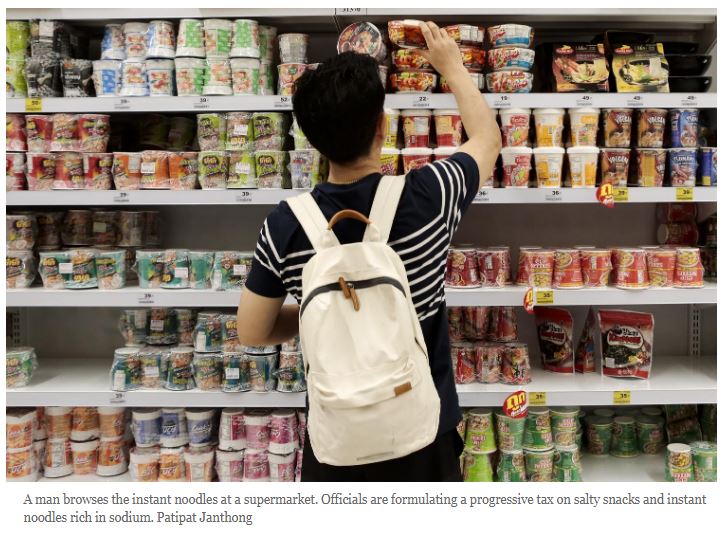Thailand: Salt tax aims to change behaviour
Instant noodles, snacks and seasoning powder have been targeted for taxation on salty foods, with the Excise Department likely to apply World Health Organisation (WHO) guidance on dietary sodium intake capped at 2,000 milligrammes per day as a benchmark to determine the levy rates.
The tax rates must be high enough to prompt consumers to change consumption behaviour, said Nutthakorn Utensute, director of the Bureau of Tax Planning. The higher the sodium content, the higher the levy, Mr Nutthakorn said.
It will be a progressive tax rate based on sodium content, he said.
Manufacturers are expected to get a reprieve of 1-2 years to give them time to adjust.
Some 60% of instant noodles, snacks and seasoning power available on the market contain more sodium than is recommended per meal, Mr Nutthakorn said.
Although Thailand’s sodium intake standard has been set at 2,400-3,000mg a day, the Excise Department wants to apply the WHO’s guidance level in setting tax rates to reduce salt consumption.
Sodium added as a flavour enhancer would be taxed, but sodium added as a preservative will be tax-exempt.
Seasoning sauces such as fish sauce and soy sauce will not be taxed, Mr Nutthakorn said.
Whether frozen foods will be subject to the tax is being debated by the Excise Department and the Public Health Ministry, he said.
The department wants to avoid taxing frozen foods to comply with the tax fairness principle, meaning that if the same fresh foods are exempt, frozen foods should also be, while the ministry prefers frozen foods to be taxed because most of them have a high sodium content.
Mr Nutthakorn referred to a WHO report noting that when sodium consumption is cut by 20-30%, non-communicable diseases such as kidney failure and high blood pressure will be reduced by 30-40%.
The levy on salty foods should be high enough to make the manufacturing sector change its products, similar to the tax on sugary drinks, he said.
From Oct 1, 2019 to Sept 30, 2021, the tax on drinks with a sugar content of 10 grammes to below 14g is raised to one baht from 50 satang per 100ml. For 14g to below 18g, the tax is increased to three baht from one baht, and for 18g onwards the levy rises to five baht from one baht.
The tax exemption for drinks containing sugar content of below 6g remains in place, and the levies on those with 6g to below 8g and 8g to below 10g remain unchanged at 10 satang and 30 satang, respectively.
Thailand enacted the excise tax on sugary drinks on Sept 16, 2017, with the goal of lowering sugar consumption. The rates are scheduled to rise on a gradual basis over four phases: Sept 16, 2017 to Sept 30, 2019; Oct 1, 2019 to Sept 30, 2021; Oct 1, 2021 to Sept 30, 2023; and from Oct 1, 2023.
Source: https://www.bangkokpost.com/business/1776634/salt-tax-aims-to-change-behaviour


 English
English




